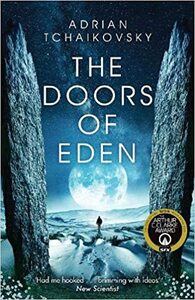Take a photo of a barcode or cover
Workman-like sci fi. A fun assortment of interesting characters, without too much time to really get into depth with any of them. An interesting and different premise involving different "timelines." Fairly compact but still dragged a bit by the end. I will give him another chance.
challenging
dark
hopeful
informative
inspiring
reflective
tense
slow-paced
Plot or Character Driven:
A mix
Strong character development:
Yes
Loveable characters:
Yes
Diverse cast of characters:
Yes
Flaws of characters a main focus:
Complicated
Mind-bending, endlessly fascinating, incessantly compassionate
Once again Tchaikovsky presents the question of what does all this mean? And answers it with grace
Once again Tchaikovsky presents the question of what does all this mean? And answers it with grace
Moderate: Deadnaming, Gun violence, Homophobia, Transphobia, Violence, Medical trauma, Murder, Lesbophobia, Colonisation
adventurous
emotional
informative
medium-paced
Plot or Character Driven:
Plot
Strong character development:
Yes
Loveable characters:
Complicated
Diverse cast of characters:
Yes
Flaws of characters a main focus:
No
Extremely entertaining - fantastic characters and an action-packed plot. The heavy-handed pop culture references are going to make this feel dated pretty rapidly, so i'm glad i found it now, instead of ten years from now. Pleased to see well-written POC and queer/trans characters taking the lead, too. Though I got pretty tired of listening to the bad guys misgender Kay. All in all, a very fun story, and one I'm likely to return to.
A weighty book featuring parallel universes (albeit all Earth centric) in which bleeding between Earths occur. Tchaikovsky interrupts the narrative with descriptions of some of these parallel universes. With everything about to collapse Tchaikovsky subverts time's linearity to give humanity a chance to get it right.
The good:
1. Many ideas floating around in the soup.
2. Some interesting parallel universes.
3. Tchaikovsky does a good job inserting our real world problems into many of the universes.
The bad:
1. Characters are rather weak. By the end I didn't much care about any of them.
2. While the end solution was interesting in that the characters had to realize one of their assumptions was absolutely incorrect, the subversion of time was a poor choice.
3. The prejudice or xenophobia was over the top. (I was so tired of reading "pug-uglies"!)
4. The parallel universe interludes disrupt the narrative.
All in all this is a good work that isn't anywhere close to his Children Of masterpieces and thus was a disappointment.
The good:
1. Many ideas floating around in the soup.
2. Some interesting parallel universes.
3. Tchaikovsky does a good job inserting our real world problems into many of the universes.
The bad:
1. Characters are rather weak. By the end I didn't much care about any of them.
2. While the end solution was interesting in that the characters had to realize one of their assumptions was absolutely incorrect, the subversion of time was a poor choice.
3. The prejudice or xenophobia was over the top. (I was so tired of reading "pug-uglies"!)
4. The parallel universe interludes disrupt the narrative.
All in all this is a good work that isn't anywhere close to his Children Of masterpieces and thus was a disappointment.
Star Rating: 5 Stars
In my epic journey to get caught up with all my new releases that have/are coming out, I decided to pick up my last one for September, The Doors of Eden by Adrian Tchaikovsky, and let’s just say that it that it went very well as it is now tied with The Empire of Gold as my favorite book of the year. This book starts off with two girls going to on a cryptozoology (monster) hunt on Bodmin Moor in Scotland, and they get more than they bargained for as one of the girls ends up disappearing and the other one is diagnosed with PTSD and called mentally unstable after she states that the birdmen took her girlfriend. However, 4 years later, her girlfriend receives a call from the aforementioned missing girl and decides to go meet up with her, only to realize that there may be more to her girlfriend’s disappearance than previously thought, and that leads to them going on an epic journey to, possibly, save the “universe.” (Universe is actually not the right word, but I don’t want to spoil the book and using the correct term would ).
My favorite part about this book and Tchaikovsky in general is his writing style. He tells his stories in a very disjointed way where he has multiple different storylines that, at first, seem like they have nothing to do with each other. I really like this because it keeps me reading as I am very curious to see where he is going with his narrative. When it comes to this particular book, I really liked the Interludes sections of this book as I am very interested in evolution and natural history (if you follow me, then you know that I love history in all its forms )and I thought it was interesting how the Interludes followed a steady passage through time and a set structure while the storyline concerning the humans slowly dissolved into insanity, although that insanity did have a structure, just not as organized as one.
Another thing that was especially prevalent in this story was the themes that he was discussing. For instance, there was a lot of discussion about God and what it takes to make a God and maintain Godhood once it is obtained. I especially liked the ideas that the journeying center of the “universe” (Again, not the right term!!!) conjured, and I just want to say that idea of God makes a lot of sense in a natural history sense/scientific sense. Because of the nature of the story, we also got a lot of commentary on acceptance- whether it be personal or societal. Most of our characters have something that makes them different, and this journey that they go on leads to a lot of conversions about what that means and how the individuals deal with it.
In reality, I know that this is one of those instances where I was 100% the intended audience for this book, and I can’t wait to see what he comes out with next. 5 stars and a new absolute favorite!!!!!
In my epic journey to get caught up with all my new releases that have/are coming out, I decided to pick up my last one for September, The Doors of Eden by Adrian Tchaikovsky, and let’s just say that it that it went very well as it is now tied with The Empire of Gold as my favorite book of the year. This book starts off with two girls going to on a cryptozoology (monster) hunt on Bodmin Moor in Scotland, and they get more than they bargained for as one of the girls ends up disappearing and the other one is diagnosed with PTSD and called mentally unstable after she states that the birdmen took her girlfriend. However, 4 years later, her girlfriend receives a call from the aforementioned missing girl and decides to go meet up with her, only to realize that there may be more to her girlfriend’s disappearance than previously thought, and that leads to them going on an epic journey to, possibly, save the “universe.” (Universe is actually not the right word, but I don’t want to spoil the book and using the correct term would ).
My favorite part about this book and Tchaikovsky in general is his writing style. He tells his stories in a very disjointed way where he has multiple different storylines that, at first, seem like they have nothing to do with each other. I really like this because it keeps me reading as I am very curious to see where he is going with his narrative. When it comes to this particular book, I really liked the Interludes sections of this book as I am very interested in evolution and natural history (if you follow me, then you know that I love history in all its forms )and I thought it was interesting how the Interludes followed a steady passage through time and a set structure while the storyline concerning the humans slowly dissolved into insanity, although that insanity did have a structure, just not as organized as one.
Another thing that was especially prevalent in this story was the themes that he was discussing. For instance, there was a lot of discussion about God and what it takes to make a God and maintain Godhood once it is obtained. I especially liked the ideas that the journeying center of the “universe” (Again, not the right term!!!) conjured, and I just want to say that idea of God makes a lot of sense in a natural history sense/scientific sense. Because of the nature of the story, we also got a lot of commentary on acceptance- whether it be personal or societal. Most of our characters have something that makes them different, and this journey that they go on leads to a lot of conversions about what that means and how the individuals deal with it.
In reality, I know that this is one of those instances where I was 100% the intended audience for this book, and I can’t wait to see what he comes out with next. 5 stars and a new absolute favorite!!!!!
I liked the ideas in this book, but they were not well executed. The characters are not compelling and the plot is way too dragged out. There were several points in the book when I thought he could have wrapped it up and just ended it, but it kept going on and on. Honestly if it were just a short collection of the interludes about other earth timelines, I would have loved this book. I give it three stars, I would give it less, but I like the world building.
adventurous
mysterious
medium-paced
Plot or Character Driven:
Plot
Strong character development:
Yes
Loveable characters:
Yes
Diverse cast of characters:
Yes
Flaws of characters a main focus:
No
Sweethearts Mal and Lee are young, reckless cryptid hunters, who like nothing more than spending their university holidays haring off after trails from grainy Youtube videos. But when one day the two women have a genuinely surreal experience, they find out that the universe is a lot more complicated than it seems, and their lives will never be the same again.
A satisfyingly weird book. It's not my favorite Tchaikovsky -- all the abstract computer stuff bored me, and the prose occasionally skates the line of "obnoxiously clever" -- but it still hit the spot. It's immensely imaginative, as Tchaikovsky's work always is, and the story is gripping. I also appreciated the representation, and Kay is a great brilliant genius.
A satisfyingly weird book. It's not my favorite Tchaikovsky -- all the abstract computer stuff bored me, and the prose occasionally skates the line of "obnoxiously clever" -- but it still hit the spot. It's immensely imaginative, as Tchaikovsky's work always is, and the story is gripping. I also appreciated the representation, and Kay is a great brilliant genius.


